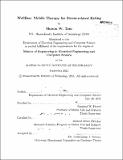WellBee : mobile therapy for stress-related eating
Author(s)
Tam, Sharon W
DownloadFull printable version (9.370Mb)
Alternative title
Mobile therapy for stress-related eating
Other Contributors
Massachusetts Institute of Technology. Dept. of Electrical Engineering and Computer Science.
Advisor
Rosalind W. Picard and Richard Ribon Fletcher.
Terms of use
Metadata
Show full item recordAbstract
Stress has been shown to affect eating behavior which may lead to eating disorders. Stress may also affect health by causing the modification of behaviors such as physical exercise, smoking, or food choices. Thus, stress-related eating is a problem that many people need help dealing with. As mobile phones have become increasingly popular, a mobile phone application seems like a potential solution and there have already been several studies involving mobile interventions for eating and stress management. This thesis takes such systems further by allowing for continuous, wireless, non-intrusive data collection of EDA, accelerometer, and skin temperature in the user's natural environment correlated with the user's reports of craving and eating incidences while providing affective support when needed via an Android phone. This system uses affect and interruption methods as well as self-report features to collect real time annotations of the user's stress and eating habits. Such a data collection system will eventually allow for a greater understanding of stress patterns that lead to stress eating behavior. Then, the system can provide just-in-time interventions when it detects that the user may lapse into stress eating. The system has been evaluated in a pilot study with seven subjects who used either the empathetic or non-empathetic system for four days, then used the opposite system for another four days, and finally, were asked to choose which version of the system they would like to use for the last four days. The non-empathetic version of the system was preferred by four of the participants, the empathetic version by two of the participants, and one participant did not notice a difference between the versions so had no preference. Overall, this thesis has contributed a new system for gathering data to study people's eating habits as correlated with their mood and stress level via an Android phone as well as insight into features that would encourage people to use in situ health monitoring systems.
Description
Thesis (M. Eng.)--Massachusetts Institute of Technology, Dept. of Electrical Engineering and Computer Science, 2011. Cataloged from PDF version of thesis. Includes bibliographical references (p. 79-80).
Date issued
2011Department
Massachusetts Institute of Technology. Department of Electrical Engineering and Computer SciencePublisher
Massachusetts Institute of Technology
Keywords
Electrical Engineering and Computer Science.